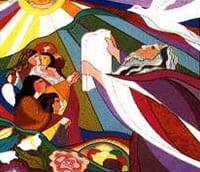 by Rabbi David Ackerman
by Rabbi David Ackerman
Shavuot is a festival with multiple identities. It is:
- a Biblical pilgrimage festival marking the first harvest of spring;
- a Rabbinic telling of the giving of the Torah at Mt. Sinai;
- a Kabbalistic (mystical) celebration of Israel’s love for Torah;
- and a community confirmation of the importance of Jewish learning for young adults.
Shavuot is all of these, yet it is still the best kept secret of all Jewish holidays. Shavuot combines biblical, rabbinic, mystical and modern traditions that celebrate the giving of the Torah, God’s gift to the Jewish people, guiding us to practice what is good and just.
The Biblical celebration, described as YOM HABIKKURIM (the day of first fruits) centers on the grateful presentation of the first spring harvest. The Rabbinic observance, suggested by the title Z’MAN MATAN TORATEINU (the time of the giving of our Torah) focuses on the meeting between God and the people of Israel, declared by our tradition to have taken place exactly seven weeks (the word SHAVUOT means “weeks”) after the Exodus from Egypt. That meeting, the Rabbis suggest, resembled a wedding—a joining together in love of a people and their God.
The Kabbalistic tradition of a TIKKUN LEYL SHAVUOT (the repair of the night of Shavuot) expands the wedding theme by viewing the festival’s first night as a time to prepare the bride (Israel) for the ceremony set to take place the next morning. In this mystical tradition, adopted by many synagogues, people stay up all night studying and teaching Torah as a way of getting ready for the big event—the reading of the Ten Commandments from the Torah—at the morning service.
Today, we have transformed the ancient ritual of presenting the first fruits to the community on Shavout with the Confirmation ceremony, at which we recognize young people who demonstrate the depth and strength of their learning.
A sense of partnership between God and the people of Israel unites all of the traditions of this festival. In these Shavuot themes—harvest, learning, receiving Torah, and joining God under a wedding canopy—each of us can find inspiration for our Jewish lives.



